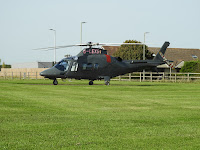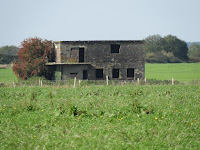Aviation images
In Reach of The Skies: Aviation related stories from a life long enthusiast
Friday, 13 October 2023
Ford Airfield
Ford is a former airfield in West Sussex. This is from the ABCT website:
Ford, the world’s most famous intruder airfield, originally opened in March 1918 for use by RAF and American squadrons prior to closing in January 1920. The site reopened for civil flying ten years later, becoming involved in early air-to-air flight refuelling experiments, and resumed military aviation connections from the end of 1937. Fleet Air Arm training units primarily employed Ford into World War Two but their base suffered extremely heavy damage and loss of life following a ferocious attack by Junkers Ju 87s on August 18 1940. As a result the RAF quickly returned and Ford gained prominence in its best known role as various intruder squadrons – notably No 23 – roamed enemy-occupied territory to attack targets at will with considerable success. Operational duties gradually altered to also include fighter-bomber sorties as the airfield became heavily involved through the vital D-Day period and beyond.
Ford kept busy during peacetime as the Fleet Air Arm returned in the summer of 1945 to enable first-line squadrons to form and work up to full readiness. Another major event occurred in August 1951 when No 800 Squadron formed at HMS Peregrine with Supermarine Attackers to become the first naval jet fighter unit. Eventually Ford was paid off or closed in November 1958 but this did not signal the end of flying by any means as civil aircraft continued to employ the airfield until all flying finally ceased in 1980. Today a wide variety of alternative uses which have become noticeable since the late 1950s are evident, ranging from industry and peripheral housing to leisure, an open prison and a popular Sunday market.
In a brief visit last weekend I snapped the Hawker Hunter (see below) that now gaurds the entrance to the market area and also visited the little memorial garden.
Thursday, 12 October 2023
Dunkeswell
Dunkeswell opened in 1943 and was handed to the USAAF who flew Liberators on anti submarine duties and helped the war against the U - Boat menace. Post war the airfield was used briefly by the RAF before being closed in 1946 and sold in 1948. However, this was not the end of flying activities and today the field opearates as a civilian airstrip for light aircraft. Several old buildings survive and are in use on the nearby industrial estate, there is a memorial to wartime use and also a small heritage centre that is free to enter. We went for a look last week after doing the Upottery center whic is only a few miles away.
Wednesday, 11 October 2023
Upottery Heritage Centre
I visited Upottery Airfield 9 years ago and pictures from that visit can be found here but although I also found the Heritage Centre at that time it was out of season and closed. However this time around it was open so we called by. The airfield has strong links with supporting the D-Day landings and it was from here that Easy Compnany as immortalised in Band of Brothers departed for Normandy in 1944 and, in fact, the airfield was used for filming in the TV series. The heritage museum, which is free to enter, focuses on the D-Day period but there are other displays relating to the Home Front, Bomber Command etc and it is based in the refurbished Officer's Mess from WWII. The chap manning the museum when we went was friendly and helpful and happy to chat and I popped a donation in the box before leaving.
Monday, 9 October 2023
Hawker Hunter WW654
This Hunter had a fairly varied service life including 5 years with the display team the Blue Herons. It was built in the 1950s and withdrawn from service in 1993 being sold by tender and ending up in a Portsmouth scrap yard. However 1n 1998 it was sold privately and after some refurbishment was mounted on a pole outside former Royal Naval Air Station at Ford. It had a full repaint 20 years ago but is now looking a little faded as I saw today.
A full history is here.
Saturday, 7 October 2023
RAF Culmhead
Culmhead in Somerset opened in 1941. Initially it was named after the nearby village of Church Staunton but to avoid confusion with Church Fenton was renamed. At the point of opening there was a very limited RAF presence in the South West which was addressed by the arival of Polish Wing Hurricanes and then Spitfires which protected the Portland area. Various other units then used the field including naval Seafires and then in 1944 the first two RAF Gloster Meteors of 616 squadron arrived for training purposes although a week later they went to RAF Manston for their first operational flight.
After this the airfield was wound down with some glider training use before closing in 1946. Although the airfield became home to a signals unit from the 1950s this came to an end in 1999 and a small business park has grown up at the intersection of the original runways. Not much of the airfield proper now survives but there is a memorial and you can alsoe see, on private land, two control towers albeit they are derelict.
Friday, 6 October 2023
RAF Exeter
The current Exeter airport began life in 1937 and was in use by Jersey Airlines flying regular trips to Jersey. However, no sooner had the venture started to get going than WWII broke out and the airfield was taken over becoming RAF Exeter and serving an important role with Fighter Command during the Battle of Britain. It went on to see USAAF service and had a role with C47s dropping parachutists in support of the Normandy landings. However, a memorial to the airfields wartime use reflects the importance of the Battle of Britain period.
Thursday, 5 October 2023
Subscribe to:
Posts (Atom)




















































